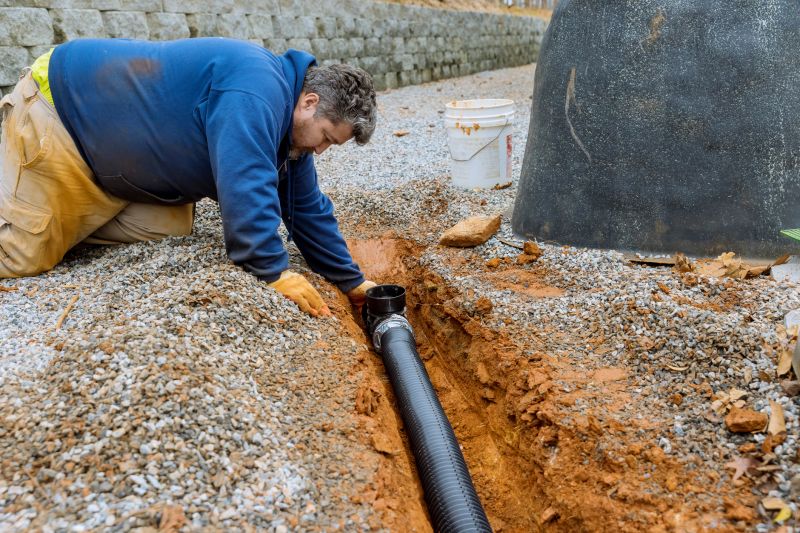Top-Rated Products For Seamless Drain Field Repairs
Choose from high-quality materials and tools designed to deliver efficient and durable drain field repair solutions.
 Drain field replacement and repair is a critical aspect of maintaining an effective and functional septic system. When a drain field begins to fail, it can lead to issues such as slow draining fixtures, foul odors, or even sewage backups. Addressing these problems typically involves selecting appropriate products designed to restore or replace the existing drain field components. These products vary widely in design, material, and application, ensuring that homeowners and professionals can find solutions tailored to specific site conditions and system requirements.
Drain field replacement and repair is a critical aspect of maintaining an effective and functional septic system. When a drain field begins to fail, it can lead to issues such as slow draining fixtures, foul odors, or even sewage backups. Addressing these problems typically involves selecting appropriate products designed to restore or replace the existing drain field components. These products vary widely in design, material, and application, ensuring that homeowners and professionals can find solutions tailored to specific site conditions and system requirements.
Top Overall Option
Drain Field Repair Kit
A comprehensive drain field repair kit offers a versatile solution for addressing common issues such as broken pipes, damaged distribution boxes, and clogged leach fields. These kits typically include a variety of fittings, sealants, and replacement parts designed to facilitate repairs without extensive excavation. They are suitable for both professional installers and experienced homeowners seeking a reliable, all-in-one solution to restore the functionality of their septic drain field.
Types of Products For Drain Field Replacement And Repairs
Flexible Drain Field Pipe
Flexible pipes are designed to adapt to various trench shapes and soil conditions, making installation easier and more adaptable.
Perforated Drain Field Pipe
Perforated pipes facilitate even distribution of effluent across the drain field area, aiding in effective drainage.
PVC Drain Field Pipe
PVC pipes are durable and resistant to corrosion, commonly used in drain field installations and repairs.
Distribution Box
Distribution boxes evenly distribute effluent from the septic tank to the drain field pipes, essential for system balance.
Leach Field Gravel
Gravel provides a filtration medium and support structure within the drain field trenches.
Drain Field Sand
Sand is used as a filtration medium and bedding material to support the drain pipes.
Septic Tank Adapter Fittings
Adapters facilitate connection between septic tanks and drain field pipes, ensuring secure and leak-proof joints.
Septic System Sealants
Sealants help prevent leaks at pipe joints and connections within the drain field system.
Drain Field Repair Clamps
Clamps are used to repair broken or cracked pipes quickly and securely.
Inspection Ports
Inspection ports allow easy access for system inspection and maintenance.
Drain Field Cover Blocks
Cover blocks support the pipes and prevent soil from collapsing into the trench.
Drain Field Repair Tape
Specialized tape provides a temporary or permanent seal for pipe repairs.
Drain Field Cleaning Solutions
Cleaning solutions help clear clogs and buildup within the drain field pipes and components.
Drain Field Replacement Mats
Mats are used to support the distribution of effluent and prevent soil compaction.
Soil Stabilization Fabric
Fabric prevents soil erosion and maintains proper drainage in the drain field area.
Popular Choices
Widely used for effective distribution of effluent across the drain field area.
Commonly selected for its role in evenly dispersing effluent from the septic tank.
Popular for its durability and ease of installation in various soil conditions.
Frequently used to connect septic tanks to drain field piping securely.
Commonly chosen as the filtration and support medium in trenches.
Popular for providing easy access for inspection and maintenance tasks.
Often used to support pipes and prevent soil collapse over the drain field.
A versatile option for addressing a variety of common drain field issues.
Frequently selected to ensure leak-proof pipe joints and connections.
Popular for quick repairs of cracked or broken pipes in the field.
Often used to maintain system efficiency by clearing buildup and clogs.
The process of replacing or repairing a drain field often requires careful assessment of the existing system's condition, soil type, and the extent of damage. Proper installation of replacement components can extend the lifespan of the septic system and improve its efficiency. It is essential to choose products that are durable, compatible with existing systems, and compliant with local codes and standards. Whether dealing with broken drain tiles, damaged distribution boxes, or clogged leach fields, there are numerous products available to address these issues effectively.
In addition to replacement parts, repair products such as sealants, adapters, and cleaning solutions can help maintain the integrity of the drain field and prevent future problems. Professionals and DIY enthusiasts alike should consider the specific needs of their septic system, the environmental conditions, and the long-term performance of the products they select. Proper installation and maintenance are key to ensuring the longevity and functionality of a septic drain field, making the right product choice a vital step in the repair process.
Key Buying Considerations
- Compatibility with existing septic system components and piping materials.
- Durability and resistance to soil and moisture conditions.
- Ease of installation, especially for DIY projects or limited access sites.
- Compliance with local building codes and environmental standards.
- Size and length of pipes or fittings to match system requirements.
- Type of soil and its drainage characteristics impacting product choice.
- Presence of corrosion-resistant materials for longevity.
- Availability of repair kits and accessories for comprehensive solutions.
- Ease of access for inspection, maintenance, and future repairs.
- Cost considerations balanced with quality and longevity.
- Availability of technical support or detailed installation instructions.
- Environmental factors that may influence material selection.
- Potential need for professional installation or consultation.
- Compatibility with septic tank outlet sizes and configurations.
- Product certifications or standards met by the components.
